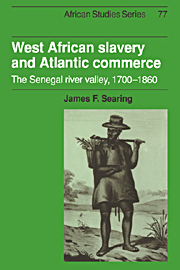Book contents
- Frontmatter
- Contents
- List of maps
- Preface
- Map 1 The Lower Senegal in the eighteenth century
- 1 Cosaan: “the origins”
- 2 Slavery and the slave trade in the Lower Senegal
- 3 The Atlantic kingdom: maritime commerce and social change
- 4 Merchants and slaves: slavery on Saint Louis and Gorée
- 5 Famine, civil war, and secession, 1750–1800
- 6 From river empire to colony: Saint Louis and Senegal, 1800–1860
- Conclusion
- Notes
- Index
- TITLES IN THE SERIES
6 - From river empire to colony: Saint Louis and Senegal, 1800–1860
Published online by Cambridge University Press: 19 October 2009
- Frontmatter
- Contents
- List of maps
- Preface
- Map 1 The Lower Senegal in the eighteenth century
- 1 Cosaan: “the origins”
- 2 Slavery and the slave trade in the Lower Senegal
- 3 The Atlantic kingdom: maritime commerce and social change
- 4 Merchants and slaves: slavery on Saint Louis and Gorée
- 5 Famine, civil war, and secession, 1750–1800
- 6 From river empire to colony: Saint Louis and Senegal, 1800–1860
- Conclusion
- Notes
- Index
- TITLES IN THE SERIES
Summary
Colonialism emerged first in the Lower Senegal on the island of Saint Louis, where the eighteenth-century system of interlocking merchant networks was replaced by a colonial system based on European dominance and African dependency. The transformation of French interests in Senegal was a result of the new international order that began to emerge after the British victory over Napoleon. In West Africa the new order signaled the ending of the slave trade, channeling European ambitions in new directions. This change was only a project in 1817, but the French who reoccupied Senegal regarded the territory as a colony in a way that the merchant directors and royal officials of the eighteenth century never had. The change in attitudes was immediately recognized by the habitants. François Valentin, who represented a prosperous métis family wrote in 1819: “They [the habitants] see that their country no longer belongs to them, that the Europeans are the masters, that soon they will no longer form the majority, that the Europeans will become more numerous than them, that they will control all of the commerce, and that the government, like Saturn, will devour its own children.”
The most important change after 1817 was the nature of the French commercial presence in Senegal. Resident French merchants, mainly from Bordeaux, representing small commercial firms replaced the merchant directors and employees of trade monopolies. Resident merchants had profoundly different attitudes toward Senegal and the habitants than their predecessors. They had a long-term commitment to the colony, where they lived for decades at a time, unlike Company officials who had appointments that lasted for a few years.
- Type
- Chapter
- Information
- West African Slavery and Atlantic CommerceThe Senegal River Valley, 1700–1860, pp. 163 - 193Publisher: Cambridge University PressPrint publication year: 1993



